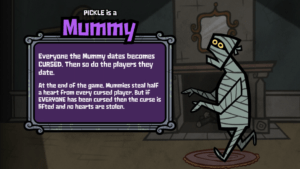
For competitive analysis with my team’s game Dating Around, I played the Jackbox minigame Monster Seeking Monster.
Monster Seeking Monster is a Halloween-monster-themed social party game with a jaunty, cartoony art style that focuses heavily on the Fellowship and Fantasy aesthetics. Each round, players have a limited amount of time to send each other private messages to try to land “dates” (with each player limited to 4 messages per round). Then, when the timer runs out, each player secretly chooses someone to “ask out.” If two players choose each other, they get a successful date, and the player with the most successful dates at the end of the game wins — although secret abilities given to each player at the beginning of the game have the potential to alter that outcome.

This game differentiates itself from similar titles by being almost entirely improv-based; instead of anchoring progression in in-game artifacts, progress relies entirely on players sending freeform messages to each other. Even most other free-text Jackbox games provide players with some sort of prompt to respond to, but this game simply lets players say whatever they want to whomever they want. Playing this with a group made up mostly of people I’m not close with, this structure initially made me nervous, but I was surprised to find the layer of fiction was enough to minimize awkwardness and make the experience fun regardless. The art style, in which the monsters are all silly little cartoons, also serves to minimize potential awkwardness by doubling down on the fact that the propositions aren’t meant to be taken seriously.

A significant insight to take away from this with regards to our game is that players are often willing to generate a rich fiction on their own (and get a lot of laughs out of it) given little more than a premise — and in a fantasy “dating” game driven by creative expression and social judging, it may not always be necessary to tie propositions down to predetermined sets of options.
There are also lessons to be taken away in balancing and avoiding abuse; while a game like this would be extremely vulnerable to collusion between players, the existence of the hidden player abilities (which are gradually revealed as the game progresses) shakes up those player motivations and causes people to rethink their plans (for example, if they don’t want to catch and spread the mummy curse).



